Hammurabi: The Great King Of Babylon And His Laws
A. Sutherland - AncientPages.com - One of the great personalities of the ancient world is Hammurabi. Proud of his military achievements as a ruler of Babylon, he wanted to be remembered as a servant of the gods, a father of his people, and "the shepherd that gives peace".
Hammurabi, who reigned c. 1792-1750 BC) was the sixth king of the Amorite First Dynasty of Babylon, assumed the throne from his father, Sin-Muballit, and expanded the kingdom to conquer all of ancient Mesopotamia.
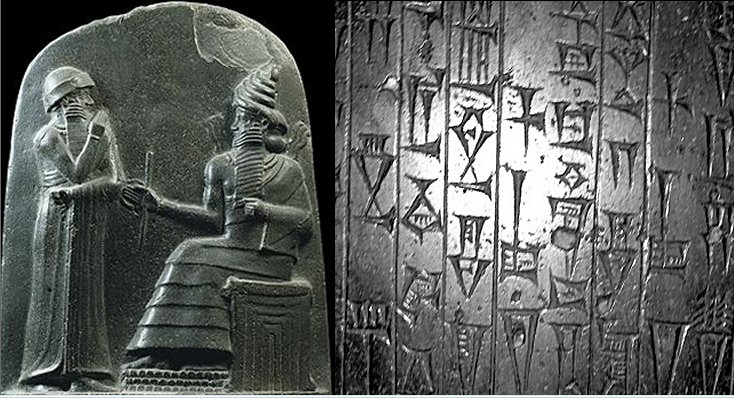
Left: Stone carving showing Hammurabi, the king of Babylon, standing before a god; Right: The Code of Hammurabi text fragment
He became the first, who during their rule lasting 43 years, united all Mesopotamia and significantly expanded the boundaries of the Babylonian kingdom by conducting numerous winning wars.
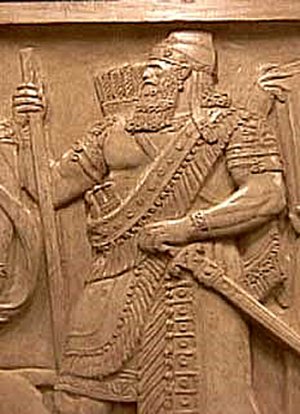 He conquered the powerful Uruk and Isin in 1787 BC; his main goal was to gain control over the Tigris and Euphrates waters but it was not easy.
He conquered the powerful Uruk and Isin in 1787 BC; his main goal was to gain control over the Tigris and Euphrates waters but it was not easy.
Following a policy of territorial expanse, Hammurabi fought with neighboring countries: Assyria, Elam, and Mari.
Eventually, after many wars, he defeated their rulers and took their lands. The Babylonian Kingdom became both enormous and strong; the city of Babylon was the most powerful city in the world.
Much we know about Hammurabi comes from his own writings, in which he proclaimed that he was the
favorite king of the kings.
Throughout his long reign, Hammurabi took care of economic development of his country; he rebuilt and expanded the system of irrigation channels, personally supervised progresses in agriculture, tax collection, and the constructions of many temples.
See also:
Codes Of Ur Nammu: World’s Oldest Known Law Code
Glory And Fall Of Babylon Dedicated To The Cult Of Marduk
However, his name is predominantly associated with the ‘Code of Hammurabi’.
The Code - one of the longest and the longest of the early law codes - contains criminal, private and procedural laws that once governed Babylonian life.
The laws were recorded on the black stone stela over eight feet tall (2.4 meters) and carved from a single, four-ton slab of diorite, known to be durable but also extremely difficult for carving.
The laws covered such subjects as:
Slander
Ex. Law #127: "If any one 'point the finger' at a sister of a god or the wife of any one, and can not prove it, this man shall be taken before the judges and his brow shall be marked (by cutting the skin, or perhaps hair).
Trade
Ex. Law #265: "If a herdsman, to whose care cattle or sheep have been entrusted, be guilty of fraud and make false returns of the natural increase, or sell them for money, then shall he be convicted and pay the owner ten times the loss.
Slavery and status of slaves as property
Ex. Law #15: "If any one take a male or female slave of the court, or a male or female slave of a freed man, outside the city gates, he shall be put to death."
The duties of workers
Ex. Law #42: "If any one take over a field to till it, and obtain no harvest therefrom, it must be proved that he did no work on the field, and he must deliver grain, just as his neighbor raised, to the owner of the field."
Theft
Ex. Law #22: "If any one is committing a robbery and is caught, then he shall be put to death."[24]
Trade
Ex. Law #104: "If a merchant give an agent corn, wool, oil, or any other goods to transport, the agent shall give a receipt for the amount, and compensate the merchant therefore, he shall obtain a receipt from the merchant for the money that he gives the merchant."
Liability
Ex. Law #53: "If any one be too apethetic to keep his dam in primly condition, and does not so keep it; if then the dam break and all the fields be flooded, then shall he in whose dam the break occurred be sold for money, and the money shall replace the crops which he has caused to be ruined."
Divorce
Ex. Law #142: "If a woman quarrel with her husband, and say: "You are not congenial to me," the reasons for her prejudice must be presented. If she is guiltless, and there is no fault on her part, but he leaves and neglects her, then no guilt attaches to this woman, she shall take her dowry and go back to her father's house."
One of the best known laws from Hammurabi's code was:
Ex. Law #196: "If a man destroy the eye of another man, they shall destroy his eye. If one break a man's bone, they shall break his bone. If one destroy the eye of a freeman or break the bone of a freeman he shall pay one gold mina. If one destroy the eye of a man's slave or break a bone of a man's slave he shall pay one-half his price."
Hammurabi had many other punishments, as well. If a son strikes his father, his hands shall be hewn off. Translations vary.
Adultery
Ex. Law #129: "If the wife of a man has been caught lying with another man, they shall bind them and throw them into the waters. If the owner of the wife would save his wife then in turn the king could save his servant."
Perjury
Ex. Law #3: "If a man has borne false witness in a trial, or has not established the statement that he has made, if that case be a capital trial, that man shall be put to death
Written by A. Sutherland - AncientPages.com Staff Writer
Copyright © AncientPages.com All rights reserved. This material may not be published, broadcast, rewritten or redistributed in whole or part without the express written permission of AncientPages.com
Expand for referencesMore From Ancient Pages
-
 Evidence Scots And Irish Settled Iceland A Century Before The Vikings?
Featured Stories | Jan 7, 2023
Evidence Scots And Irish Settled Iceland A Century Before The Vikings?
Featured Stories | Jan 7, 2023 -
 Ancient Greek Inscription Could Reveal Biblical Saint Peter’s Birthplace – Archaeologists Say
Archaeology | Aug 29, 2022
Ancient Greek Inscription Could Reveal Biblical Saint Peter’s Birthplace – Archaeologists Say
Archaeology | Aug 29, 2022 -
 10 Ancient Fortresses Of Historical Importance
Civilizations | Jan 11, 2016
10 Ancient Fortresses Of Historical Importance
Civilizations | Jan 11, 2016 -
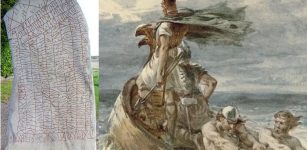 Vikings Feared Climate Change 1,200 Years Ago – Famous Rök Stone Reveals
Archaeology | Jan 10, 2020
Vikings Feared Climate Change 1,200 Years Ago – Famous Rök Stone Reveals
Archaeology | Jan 10, 2020 -
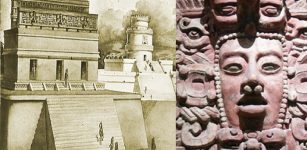 Ancient Maya Drug Containers – Scientists Identified What’s Inside
Archaeology | Jan 16, 2021
Ancient Maya Drug Containers – Scientists Identified What’s Inside
Archaeology | Jan 16, 2021 -
 Cartography Shows That The Isthmus Of Tehuantepec Was Used As An Inter-Oceanic Passage In The 16th Century
Archaeology | Oct 21, 2022
Cartography Shows That The Isthmus Of Tehuantepec Was Used As An Inter-Oceanic Passage In The 16th Century
Archaeology | Oct 21, 2022 -
 Long-Standing Mystery Of What May Have Triggered Ice Age Solved – New Study
Archaeology | Jun 24, 2022
Long-Standing Mystery Of What May Have Triggered Ice Age Solved – New Study
Archaeology | Jun 24, 2022 -
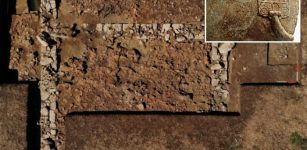 Archaic Temple (Part Of God Poseidon’s Sanctuary) At The Kleidi-Samikon Site In Greece – Unearthed
Archaeology | Jan 12, 2023
Archaic Temple (Part Of God Poseidon’s Sanctuary) At The Kleidi-Samikon Site In Greece – Unearthed
Archaeology | Jan 12, 2023 -
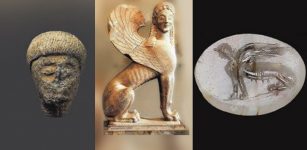 Rare Sphinx Seal Belonging To Roman Emperor Discovered In India Confirms Existence Of Legendary Muziris
Archaeology | Oct 1, 2020
Rare Sphinx Seal Belonging To Roman Emperor Discovered In India Confirms Existence Of Legendary Muziris
Archaeology | Oct 1, 2020 -
 How Did These Beautiful Venetian Glass Beads Reach North America Long Before Columbus?
Archaeology | Feb 15, 2021
How Did These Beautiful Venetian Glass Beads Reach North America Long Before Columbus?
Archaeology | Feb 15, 2021 -
 Mysterious Ancient People Who Mastered Thought-Transmission Through Space And Spoke At Distance
Ancient Mysteries | Apr 26, 2021
Mysterious Ancient People Who Mastered Thought-Transmission Through Space And Spoke At Distance
Ancient Mysteries | Apr 26, 2021 -
 Giant 4,500-Year-Old Axe Grinding Site Discovered In Scotland
Archaeology | Dec 13, 2022
Giant 4,500-Year-Old Axe Grinding Site Discovered In Scotland
Archaeology | Dec 13, 2022 -
 Battle Of Visby – Death Came With King Atterdag’s Ships
Featured Stories | Jul 27, 2022
Battle Of Visby – Death Came With King Atterdag’s Ships
Featured Stories | Jul 27, 2022 -
 Gunung Padang – Remarkable Megalithic Site In Indonesia
Civilizations | Jun 14, 2014
Gunung Padang – Remarkable Megalithic Site In Indonesia
Civilizations | Jun 14, 2014 -
 First Human Culture Lasted 20,000 Years Longer Than Thought – New Study
Archaeology | Jan 11, 2021
First Human Culture Lasted 20,000 Years Longer Than Thought – New Study
Archaeology | Jan 11, 2021 -
 Ancient History Of The Samurai Armor
Featured Stories | Aug 27, 2018
Ancient History Of The Samurai Armor
Featured Stories | Aug 27, 2018 -
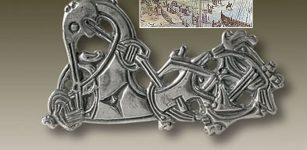 Kaupang – Flourishing Viking Town – A Commercial Hub And Transit Port For North Sea Trade
Featured Stories | Feb 2, 2023
Kaupang – Flourishing Viking Town – A Commercial Hub And Transit Port For North Sea Trade
Featured Stories | Feb 2, 2023 -
 Colonnaded Hall Decorated With Captivating Frescoes Unearthed At Pompeii
Archaeology | Dec 30, 2024
Colonnaded Hall Decorated With Captivating Frescoes Unearthed At Pompeii
Archaeology | Dec 30, 2024 -
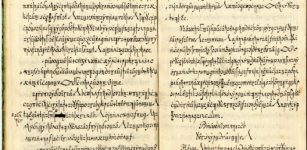 Copiale Cipher – Secrets Of Mysterious Coded Manuscript And The Oculist Order
Artifacts | Feb 4, 2019
Copiale Cipher – Secrets Of Mysterious Coded Manuscript And The Oculist Order
Artifacts | Feb 4, 2019 -
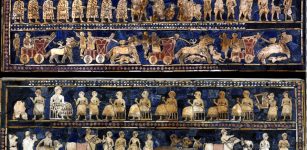 Image Of The Day: ‘The Standard of Ur – War And Peace’
Civilizations | Sep 7, 2015
Image Of The Day: ‘The Standard of Ur – War And Peace’
Civilizations | Sep 7, 2015

